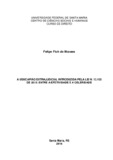| dc.contributor.advisor | Coelho, José Fernando Lutz | |
| dc.creator | Moraes, Felipe Fich de | |
| dc.date.accessioned | 2017-09-13T14:57:21Z | |
| dc.date.available | 2017-09-13T14:57:21Z | |
| dc.date.issued | 2016-12-15 | |
| dc.date.submitted | 2016 | |
| dc.identifier.uri | http://repositorio.ufsm.br/handle/1/11670 | |
| dc.description | Trabalho de conclusão de curso (graduação) - Universidade Federal de Santa Maria, Centro de Ciências Sociais e Humanas, Curso de Direito, RS, 2017. | por |
| dc.description.abstract | he adverse possession is one of the basic institutes of brazilian civil law, being one of the most important ways of original acquisition of property and land regularization. In contrast, o judicial procedure of adverse possession is traditionally slow, often resulting in the incapacity of effective guardianship of the right of property as result of the Judiciary Power slowness itself. In this context the extrajudicial procedure of adverse possession, introduced by the Law n. 13.105 of 2015 (Code of Civil Process), which added the article 216-A to the Law n. 6.105, of 1973. The procedure removed from jurisdictional appreciation the guardianship of adverse possession, taking it to the administrative sphere, allowing the processing before the Office of Registry of Properties, promising with this to impress celerity to the declaration of adverse property acquisition. The present paper analyze if the extrajudicial adverse possession is, in fact, capable of allowing celerity and effectiveness to the acquisition of property by adverse possession. To achieve that goal, it will be analyzed the principles of the institute and of the removal from jurisdictional appreciation of adverse possession, as well as a critical analysis of the procedure itself as opposed to its objectives, stating from a legislative and doctrinal analysis. It was concluded that the extrajudicial adverse possession is an adequate measure in the way that allocates the guardianship of material law to the correct sphere, as pretended by the principles of the institute, but it fails on the way that is established on not being able of disposing the bureaucratic tradition and allowing an effective guardianship of adverse possession and property law. | eng |
| dc.language | por | por |
| dc.publisher | Universidade Federal de Santa Maria | por |
| dc.rights | Acesso Aberto | por |
| dc.subject | Uuscapião | por |
| dc.subject | Extrajudicial | por |
| dc.subject | Direito de propriedade | por |
| dc.subject | Property law | eng |
| dc.subject | Adverse possession | eng |
| dc.subject | Extrajudicial | eng |
| dc.title | A usucapião extra judicial introduzida pela lei n.13105 de 2015: entre a efetividade e a celeridade | por |
| dc.title.alternative | The extrajudicial adverse possession introduced by the law n. 13.105 of 2015: between the effectiveness and the celerity | eng |
| dc.type | Trabalho de Conclusão de Curso de Graduação | por |
| dc.degree.local | Santa Maria, RS, Brasil | por |
| dc.degree.graduation | Direito | por |
| dc.description.resumo | A usucapião é um dos institutos fundamentais do direito civil brasileiro, sendo uma importante forma de aquisição originária da propriedade e regularização fundiária. Em contraste, o procedimento judicial da usucapião é tradicionalmente lento, resultando muitas vezes na incapacidade de tutela efetiva do direito de propriedade em decorrência da própria morosidade do Poder Judiciário. Nesse contexto surgiu o procedimento extrajuducial de usucapião, introduzido pela Lei n. 13.105 de 2015 (Código de Processo Civil), que adicionou o artigo 216-A à Lei n. 6.015, de 1973. O procedimento deslocou desjudicializou a tutela da usucapião, levando-a para âmbito administrativo, permitindo procedimento diretamente no Ofício de Registro de Imóveis, prometendo com isso imprimir celeridade à declaração da usucapião. O presente trabalho analisa se a usucapião extrajudicial é, de fato, capaz de imprimir celeridade e efetividade à aquisição da propriedade por usucapião. Para atingir esse objetivo, serão analisados os fundamentos do instituto e da desjudicialização da usucapião, bem como uma análise crítica do procedimento em si e em relação a seus objetivos, a partir de análise legislativa e doutrinária. Concluiu-se que a usucapião extrajudicial é medida adequada no sentido de deslocar o âmbito de prestação da tutela do direito material, em alinhamento com a fundamentação do instituto, porém falha o procedimento na medida em que é estabelecido em se desfazer da tradição burocrática e conseguir de fato permitir uma tutela efetiva usucapião e do direito de propriedade. | por |
| dc.publisher.country | Brasil | por |
| dc.publisher.initials | UFSM | por |
| dc.subject.cnpq | CNPQ::CIENCIAS SOCIAIS APLICADAS::DIREITO | por |
| dc.publisher.unidade | Centro de Ciências Sociais e Humanas | por |


